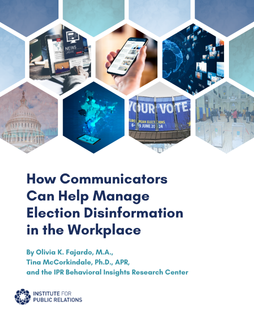The results of a recently released study suggest that digitalization is the key technology trend to affect PR/Comms in the mid-term yet very few respondents envision their role to “have a research led strategic insight function” within their organization in the near future. It is fair to assume that discussions about giving a central role to research, measurement and evaluation will continue to remain pertinent in the years to come.
Carried out during November 2018 and March 2019 by Dr Ana Adi from Quadriga University of Applied Sciences (and member of the IPR Measurement & Evaluation Commission), the Delphi method study called PR2025 asked senior communication practitioners, consultants, academics to identify trends, competences, solutions and development responsibilities that would help PR/Communication practitioners maintain confidence in the profession and enhance relevance of their work in the mid-term. The study asked respondents to reflect on their current role, their envisaged role for PR/Comms in society in the mid-term as well on career paths for the future (excluding hierarchical progressions). 62 people completed the first qualitative round and 37 the second, quantitative round, most of them based in Europe.
Measurement and evaluation came into discussion in several areas of the study, either directly or as result. For instance, speaking about their envisaged role within their own organization in the mid-term respondents overwhelmingly believe their role to be to “support business objectives” (65.19%) followed by “play an advisory role” (50.37%). Only 3.15% of the respondents envisaged the role of PR in their organization to “have a research led strategic insight function”. While one could argue that supporting business objectives and playing an advisory role both encompass a research and evaluation component, this might not necessarily be the case.
Big data analysis: Making sense of social media data via big data analysis will have a huge impact on communications. Artificial intelligence: that can help to automatize individualized content production and individualized content distribution. Social bots: as they become more sophisticated and are more and more difficult to detect, they will have the power to shape the public discourse and opinion of organizations and their products and services. Collaboration software: Technologies (tools and software) supporting agile working will help organization to succeed with agile working. (F, academia/research)
Respondents were also asked to identify the technological trends that are likely to influence the PR/Comms practice in the mid-term. While the list is long, and features numerous references to digitalization, artificial intelligence, big data, these are clearly made in a context of reflection of what their meaning and impact on the profession and its practices are. This is perhaps why, beyond listing AI as a trend to watch, participants also point towards more specific implications of using technology including privacy, ethics and measurement and evaluation. These include (although no consensus threshold has been achieved):
- social media (48.61%)
- improved measurement/analytics tools for communicators including predictive analytics) (44.44%) and
- big data driven analysis (41.46%)
Moving forward and considering the competences needed to respond to these trends, digital literacy is listed as the number one technical competence while strategy (from development to implementation and evaluation) as the core business/managerial competence. Needless to say, looking at the near future of PR/Comms, evaluation (with all its facets from basic research to integrating technology or developing it) will remain a central concern for practitioners.




